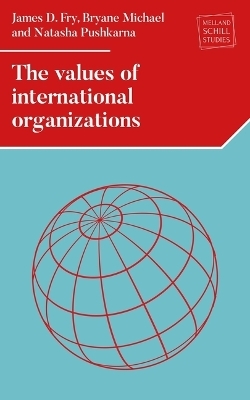
The Values of International Organizations
Seiten
2024
Manchester University Press (Verlag)
978-1-5261-8242-5 (ISBN)
Manchester University Press (Verlag)
978-1-5261-8242-5 (ISBN)
This book’s statistical and legal analyses of international organizations’ constitutions reveal new interpretations of international organizations law. It provides a map of international organizations’ values, and a healthy start towards fully understanding that map, thereby helping global governance take a quantum leap forward. -- .
From the United Nations to the International Bureau of Weights and Measures, the principles of international organizations affect all of our lives. The principles these organizations live by represent, at least in part, the principles all of us live by. This book quantifies international organizations’ affiliation with particular principles in their constitutions, like cooperation, peace and equality.
Offering a sophisticated statistical and legal analysis of these principles, the authors reveal the values contained in international organizations’ constitutions and their relationship with one another. When these organizations are divided into groups, like regional versus universal organizations, many new, seemingly contradictory, interpretations of international organizations law emerge. Through elaborate network representations, radar charters, k-clusters analyses and scatter plots, this book offers an unprecedented insight into the principles and values of international organizations. -- .
From the United Nations to the International Bureau of Weights and Measures, the principles of international organizations affect all of our lives. The principles these organizations live by represent, at least in part, the principles all of us live by. This book quantifies international organizations’ affiliation with particular principles in their constitutions, like cooperation, peace and equality.
Offering a sophisticated statistical and legal analysis of these principles, the authors reveal the values contained in international organizations’ constitutions and their relationship with one another. When these organizations are divided into groups, like regional versus universal organizations, many new, seemingly contradictory, interpretations of international organizations law emerge. Through elaborate network representations, radar charters, k-clusters analyses and scatter plots, this book offers an unprecedented insight into the principles and values of international organizations. -- .
James D. Fry is Associate Professor and Director of the LLM Programme in the Faculty of Law at the University of Hong Kong Bryane Michael is a Senior Fellow in the Faculty of Law at the University of Hong Kong Natasha Pushkarna is a Senior Fellow in the Faculty of Law at the University of Hong Kong -- .
List of organizations studied
1 The principles guiding international organizations
2 The empirics of international organizational principles
3 Patterns of authority in international organizations' constitutions
4 The jurisprudence of organizations' aspirational values
5 Towards a new jurisprudence of international organizations law
6 Conclusion
Bibliography
Index -- .
| Erscheinungsdatum | 29.10.2024 |
|---|---|
| Reihe/Serie | Melland Schill Studies in International Law |
| Zusatzinfo | 27 black & white figures; 13 tables |
| Verlagsort | Manchester |
| Sprache | englisch |
| Maße | 156 x 234 mm |
| Gewicht | 397 g |
| Themenwelt | Recht / Steuern ► EU / Internationales Recht |
| Recht / Steuern ► Öffentliches Recht ► Völkerrecht | |
| ISBN-10 | 1-5261-8242-4 / 1526182424 |
| ISBN-13 | 978-1-5261-8242-5 / 9781526182425 |
| Zustand | Neuware |
| Haben Sie eine Frage zum Produkt? |
Mehr entdecken
aus dem Bereich
aus dem Bereich


